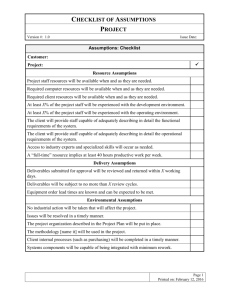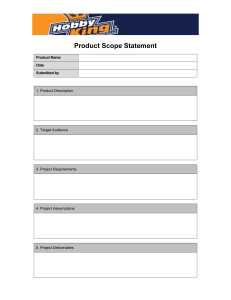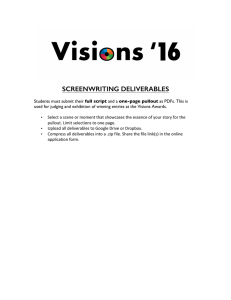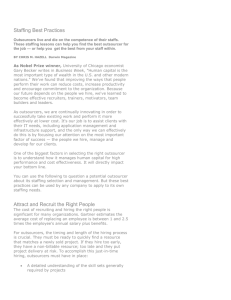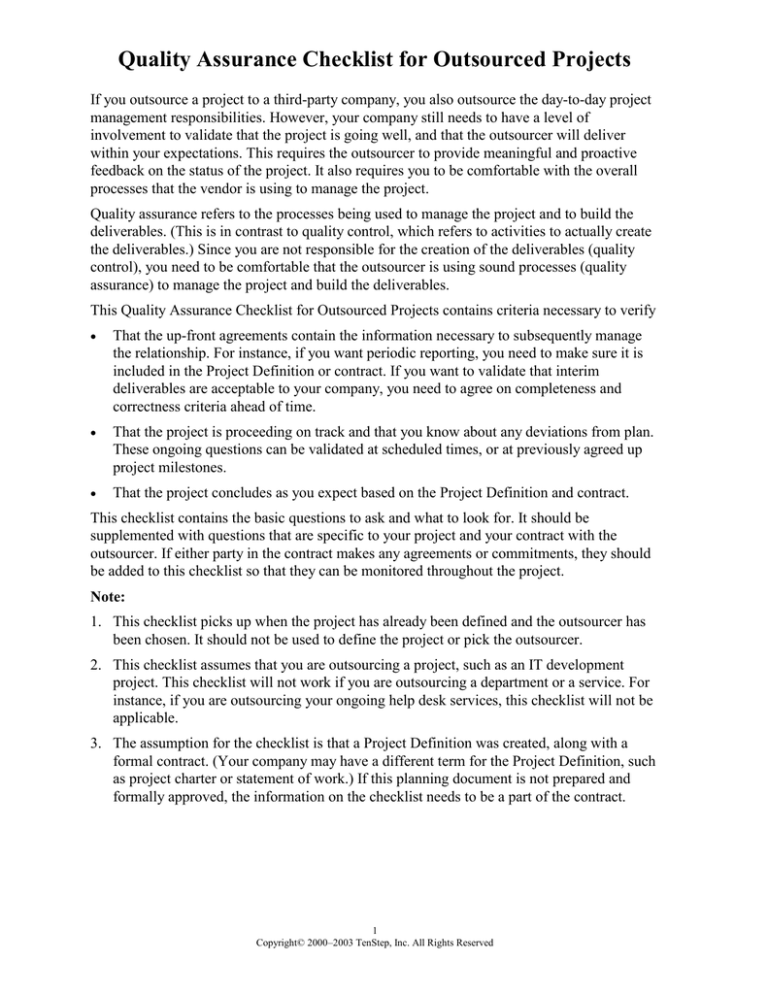
Quality Assurance Checklist for Outsourced Projects
If you outsource a project to a third-party company, you also outsource the day-to-day project
management responsibilities. However, your company still needs to have a level of
involvement to validate that the project is going well, and that the outsourcer will deliver
within your expectations. This requires the outsourcer to provide meaningful and proactive
feedback on the status of the project. It also requires you to be comfortable with the overall
processes that the vendor is using to manage the project.
Quality assurance refers to the processes being used to manage the project and to build the
deliverables. (This is in contrast to quality control, which refers to activities to actually create
the deliverables.) Since you are not responsible for the creation of the deliverables (quality
control), you need to be comfortable that the outsourcer is using sound processes (quality
assurance) to manage the project and build the deliverables.
This Quality Assurance Checklist for Outsourced Projects contains criteria necessary to verify
That the up-front agreements contain the information necessary to subsequently manage
the relationship. For instance, if you want periodic reporting, you need to make sure it is
included in the Project Definition or contract. If you want to validate that interim
deliverables are acceptable to your company, you need to agree on completeness and
correctness criteria ahead of time.
That the project is proceeding on track and that you know about any deviations from plan.
These ongoing questions can be validated at scheduled times, or at previously agreed up
project milestones.
That the project concludes as you expect based on the Project Definition and contract.
This checklist contains the basic questions to ask and what to look for. It should be
supplemented with questions that are specific to your project and your contract with the
outsourcer. If either party in the contract makes any agreements or commitments, they should
be added to this checklist so that they can be monitored throughout the project.
Note:
1. This checklist picks up when the project has already been defined and the outsourcer has
been chosen. It should not be used to define the project or pick the outsourcer.
2. This checklist assumes that you are outsourcing a project, such as an IT development
project. This checklist will not work if you are outsourcing a department or a service. For
instance, if you are outsourcing your ongoing help desk services, this checklist will not be
applicable.
3. The assumption for the checklist is that a Project Definition was created, along with a
formal contract. (Your company may have a different term for the Project Definition, such
as project charter or statement of work.) If this planning document is not prepared and
formally approved, the information on the checklist needs to be a part of the contract.
1
Copyright© 2000–2003 TenStep, Inc. All Rights Reserved
Quality Assurance Checklist for Outsourced Projects
Beginning of the Project
Project Definition
Has a Project Definition (or similar document) been prepared by your company or the outsourcer?
Has the project scope been clearly defined, including a description of every final deliverable to be produced?
Have any areas out of scope been clearly documented?
Have expectations been agreed to for the level of quality of the deliverables, including completeness and
correctness criteria?
Have overall project costs been documented and agreed to?
Have firm deadline dates been agreed to and confirmed?
Has systems, user, and code documentation been included as deliverables?
Have training needs been addressed as deliverables?
Has a Project Definition been approved in writing by the appropriate stakeholders and managers at your company
and the outsourcer?
Has a comprehensive project workplan been created by the outsourcer? (Your company does not need to approve
it. Just validate that it exists and is reasonable.)
Project Management Procedures
Does the outsourcer have clear procedures in place for managing issues, scope, and risk?
Is your company clear on what its role is in the management of issues, scope, and risk?
Does the outsourcer have a process in place to manage overall quality?
Do your company and the outsourcer have an agreement on the level and frequency of formal communication that
is expected during the project?
Has the vendor been clear on what resources they need from your company and when they will be needed?
Have turnover procedures been established and agreed to?
Have a number of milestones been established to review progress so far and validate the project is on track for
completion?
Contract
Is there a contractual agreement that spells out the expectations of both parties in terms of deliverables to be
produced, deadlines, payment schedule, completeness and correctness criteria, etc?
Does the contract describe a process for amending the agreement in the future?
Does the contract state the consequences for the outsourcer of failing to meet deadline or quality expectations?
If interim payments are expected, is the contract clear on when they will be made, and what expectations need to be
achieved for the interim payment to be made?
Are appropriate security and nondisclosure statements included in the contract?
Are appropriate code ownership and property rights included in the contract?
Has the contract been prepared, reviewed, and approved by your legal department?
Has the contract been formally signed by your sponsor, the outsourcer, and any other appropriate parties?
Any questions that have been answered “no” should be pursued and explained. Usually this is
a sign that there is cause for concern. The more questions that are answered “no,” the more
potential trouble the project is in. Work with the outsourcer to explain the reason for the “no”
answer, and determine what can be done to remedy the situation.
2
Copyright© 2000–2003 TenStep, Inc. All Rights Reserved
Y/N
Quality Assurance Checklist for Outsourced Projects
Ongoing Questions
Validate at Key Milestones
Project Management
Can the vendor clearly explain where the project is vs. where it should be at this time?
Is the outsourcer following their procedures for managing issues, scope, risk, quality, etc.?
Are issues being resolved in a timely manner?
Are scope change requests being managed, and is the sponsor formally approving changes?
Are risks being identified and managed successfully?
Is communication between the outsourcer and your company occurring as agreed to?
Should the contract or Project Definition be updated to reflect any major changes to the project?
Is your company clear on what resources are required to assist the outsourcer in the completion of the project?
Deliverables
Have the deliverables specified in the Project Definition and the contract been completed up to this point?
Will all the future deliverables specified in the Project Definition be completed on time and within budget?
Have all deliverables from the outsourcer been formally approved based on adherence to the agreed upon
completeness and correctness criteria?
Contract
If interim payments are expected, has the outsourcer completed all required work up to this point — to the agreed
upon level of quality?
Have all terms and conditions of the contract been satisfied as expected for this point in the project?
Should the contract or Project Definition be updated to reflect any major changes to the project?
Any questions that have been answered “no” should be pursued and explained. Usually this is
a sign that there is cause for concern. The more questions that are answered “no,” the more
potential trouble the project is in. Work with the outsourcer to explain the reason for the “no”
answer, and determine what can be done to remedy the situation.
3
Copyright© 2000–2003 TenStep, Inc. All Rights Reserved
Y/N
Quality Assurance Checklist for Outsourced Projects
End of Project
Have the deliverables specified in the Project Definition and the contract been completed as specified in the
Completeness and Correctness Criteria document?
Have all agreed upon deliverables been formally approved and accepted?
Have all contractual obligations been completed?
Has turnover occurred as expected based on prior agreements?
Has training occurred as expected based on prior agreements?
Has documentation been completed and turned over as expected based on prior agreements?
Have payments been made to the outsourcer based on the completion of agreed upon interim deliverables?
Is your company ready to complete the contract and make final payments?
The project should be ready to be completed and shut down. Any questions that have been
answered “no” should be pursued and explained.
4
Copyright© 2000–2003 TenStep, Inc. All Rights Reserved
Y/N

